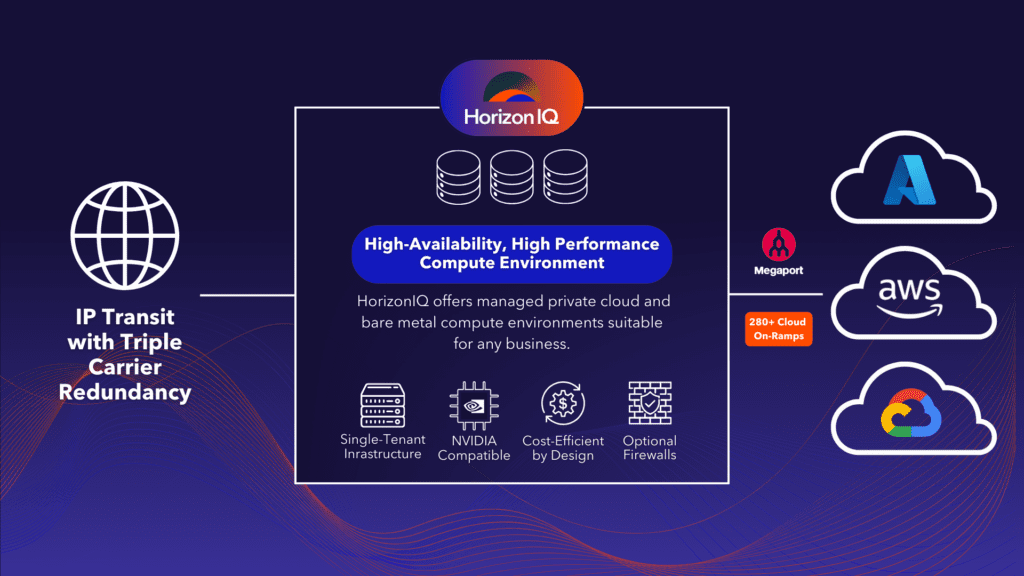
What Is Hybrid Cloud Architecture?
Hybrid cloud architecture refers to an IT infrastructure setup that combines private cloud, public cloud, and sometimes on-prem environments, integrated to work as a single, cohesive system. It gives organizations the flexibility to run workloads in the most appropriate environment while enabling seamless data and workload portability.
At its core, hybrid cloud architecture is about balancing control and scalability. Businesses can keep sensitive data and mission-critical workloads in secure, single-tenant environments while using public cloud services to scale up quickly or support less-sensitive workloads. This blend allows for cost optimization, regulatory compliance, and infrastructure agility.
Why Is Hybrid Cloud Architecture Important in 2025?
As of 2025, over 84% of companies use at least one private cloud, and more than 32% of enterprise workloads run in private environments. With rising concerns around cloud spend, data sovereignty, and AI infrastructure needs, hybrid cloud offers a future-proof path forward.
Gartner predicts cloud services will become a business necessity by 2028, but not all workloads are fit for hyperscaler public clouds. Hybrid cloud architecture enables businesses to:
- Achieve cost predictability and control
- Optimize for performance with low-latency infrastructure
- Maintain compliance with regulations like HIPAA, GDPR, and SOC 2
- Scale AI, analytics, and edge workloads with dedicated GPU-powered private environments
How Does Hybrid Cloud Architecture Work?

Hybrid cloud architecture works by connecting multiple environments, such as a managed private cloud (like HorizonIQ), public cloud endpoints (AWS, Azure, GCP), and sometimes on-prem data centers, via secure networking and orchestration layers.
Key components include:
- Private Cloud Infrastructure: Single-tenant ifrastructure that offers dedicated resources, compliance, and predictable performance.
- Public Cloud Integration: Enables elasticity and scale, which is ideal for burst workloads or experimentation.
- Networking Layer: Includes cloud on-ramps, cross-connects, and SD-WAN to provide fast, secure data transfer between environments.
- Management and Orchestration Tools: Tools like HorizonIQ Compass unify visibility, cost control, and performance monitoring across environments.
What Are the Benefits of Hybrid Cloud Architecture?
Hybrid cloud brings together the best of both worlds. Some key benefits include:
- Flexibility: Run each workload in the most appropriate environment.
- Cost Optimization: Keep predictable workloads in private cloud to avoid surprise bills.
- Security and Compliance: Use single-tenant infrastructure to isolate sensitive data and meet regulatory standards.
- Scalability: Burst into the public cloud during seasonal spikes or AI training runs.
- Resilience: Architect for failover and disaster recovery across environments.
What’s the Difference Between Hybrid Cloud and Multicloud?
While the terms are often used interchangeably, hybrid cloud and multicloud represent different strategies.
- Hybrid Cloud: Focuses on integration between private and public cloud environments. Workloads can move between them as needed.
- Multicloud: Involves using services from multiple public cloud providers (e.g., AWS + GCP), often without deep integration.
In short: Hybrid cloud = integration. Multicloud = diversification.
HorizonIQ specializes in hybrid architectures because they offer more control, cost efficiency, and resilience, especially when managed through a centralized platform.
What Industries Benefit Most from Hybrid Cloud Architectures?
Hybrid cloud architecture is ideal for industries that need both control and flexibility:
Industry |
Use Case |
Healthcare |
Host electronic health records (EHRs) on-prem or in a secure private cloud while using public cloud for analytics. |
Financial Services |
Meet PCI DSS and SOC 2 requirements while enabling innovation with AI-powered tools. |
Gaming |
Combine low-latency bare metal with cloud-based scaling for traffic spikes. |
Media & Entertainment |
Process and store large volumes of content with performance and control. |
Government & Legal |
Maintain air-gapped, compliant environments while enabling modern workflows. |
How Does HorizonIQ Strengthen Hybrid Cloud Capabilities?
HorizonIQ’s hybrid cloud platform goes beyond basic integration—it’s designed for intelligent workload management, performance scaling, and operational control:
- Workload Placement Control: HorizonIQ Hybrid Cloud lets you run predictable, steady workloads on flat-rate private infrastructure to control costs. When demand spikes, workloads can automatically burst into AWS, Azure, or GCP using HorizonIQ’s load balancer. You can define maximum connection thresholds, and when exceeded, overflow traffic is routed to public cloud targets. Alternatively, workload orchestration can be handled using infrastructure as code or public cloud auto-scaling policies.
- AI-Ready Infrastructure: For machine learning and AI development, HorizonIQ enables training on public cloud GPUs with cost-effective inference running on dedicated, secure private infrastructure. Our environments are fully compatible with lightweight and local models, supporting fast iteration and stable deployment.
- Real-Time Traffic Spike Scalability: The architecture supports elastic scaling to public cloud in real time without impacting uptime or performance. Thanks to low-latency interconnects and a 100% uptime SLA, your applications remain responsive even during peak usage.
- Security & Compliance: Sensitive workloads run on single-tenant, private infrastructure with full data isolation, while less critical tasks can burst into the public cloud. This allows you to maintain compliance (HIPAA, PCI DSS, SOC 2) without extending audit scopes unnecessarily.
- Container Support: HorizonIQ’s Proxmox-based infrastructure natively supports containers and Kubernetes, making it easy to deploy modern workloads in hybrid environments.
- Flexible Deployment Models: Choose between a fully self-managed environment or let HorizonIQ manage your entire hybrid setup. This flexibility suits a wide range of technical teams and resourcing levels.
Is Hybrid Cloud Architecture Right for Your Business?
If your organization needs more control, better performance, and improved cost visibility (but still wants the flexibility of public cloud), hybrid cloud architecture could be your answer.
HorizonIQ makes it easy to architect, deploy, and manage a hybrid environment tailored to your business goals. Whether you’re modernizing legacy apps, scaling AI infrastructure, or navigating compliance frameworks, we’re here to help.
Ready to build a resilient hybrid cloud architecture? Contact us to explore the possibilities.


